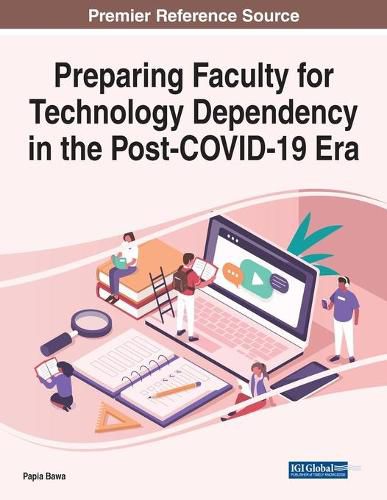Readings Newsletter
Become a Readings Member to make your shopping experience even easier.
Sign in or sign up for free!
You’re not far away from qualifying for FREE standard shipping within Australia
You’ve qualified for FREE standard shipping within Australia
The cart is loading…






This title is printed to order. This book may have been self-published. If so, we cannot guarantee the quality of the content. In the main most books will have gone through the editing process however some may not. We therefore suggest that you be aware of this before ordering this book. If in doubt check either the author or publisher’s details as we are unable to accept any returns unless they are faulty. Please contact us if you have any questions.
To cope with the pandemic, many educational institutions in the United States have resorted to emergency remote teaching (ERT). Distance/online learning is a complex process in terms of the design, analysis, and time taken to develop and implement courses and programs. Having been around for decades, it has evolved and morphed into a multidimensional procedure that needs meticulous planning, evolution, and evaluation. It provides meaningful learning experiences to students who may not otherwise have the option to attend college. Students of distance/online courses and programs usually choose to join voluntarily, and designers of such programs purposefully plan for them to be online from the start. In contrast, ERT is an emergency/crisis-based need to move teaching and learning to alternative environments until the crisis is averted or ended.
Preparing Faculty for Technology Dependency in the Post-COVID-19 Era is a comprehensive guide that focuses on preparing pre-service teachers, in-service teachers, and higher education faculty to harness technology dependence in an emergency remote teaching era by discussing current and post-pandemic preparedness. Covering a wide range of topics such as digital reality, teacher preparedness, and technology dependency, this book is crucial for educators, administrators, pre-service teachers, researchers, academicians, and students.
$9.00 standard shipping within Australia
FREE standard shipping within Australia for orders over $100.00
Express & International shipping calculated at checkout
This title is printed to order. This book may have been self-published. If so, we cannot guarantee the quality of the content. In the main most books will have gone through the editing process however some may not. We therefore suggest that you be aware of this before ordering this book. If in doubt check either the author or publisher’s details as we are unable to accept any returns unless they are faulty. Please contact us if you have any questions.
To cope with the pandemic, many educational institutions in the United States have resorted to emergency remote teaching (ERT). Distance/online learning is a complex process in terms of the design, analysis, and time taken to develop and implement courses and programs. Having been around for decades, it has evolved and morphed into a multidimensional procedure that needs meticulous planning, evolution, and evaluation. It provides meaningful learning experiences to students who may not otherwise have the option to attend college. Students of distance/online courses and programs usually choose to join voluntarily, and designers of such programs purposefully plan for them to be online from the start. In contrast, ERT is an emergency/crisis-based need to move teaching and learning to alternative environments until the crisis is averted or ended.
Preparing Faculty for Technology Dependency in the Post-COVID-19 Era is a comprehensive guide that focuses on preparing pre-service teachers, in-service teachers, and higher education faculty to harness technology dependence in an emergency remote teaching era by discussing current and post-pandemic preparedness. Covering a wide range of topics such as digital reality, teacher preparedness, and technology dependency, this book is crucial for educators, administrators, pre-service teachers, researchers, academicians, and students.